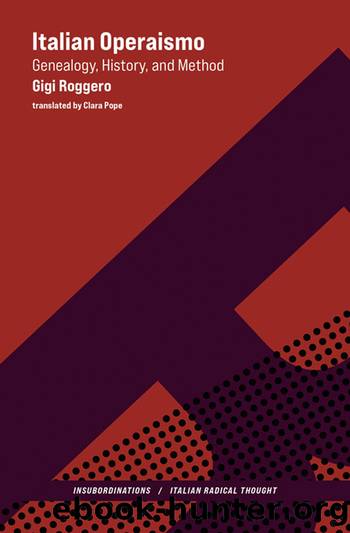Italian Operaismo by Gigi Roggero

Author:Gigi Roggero [Roggero, Gigi]
Language: eng
Format: epub
Publisher: MIT Press
Published: 2023-02-27T00:00:00+00:00
6
Returning to First Principles
What is left of operaismo after the defeat of the mass worker and the premature abortion of the autonomous development of the âsocial workerâ? For some, nothing. For others, âpost-operaismo.â For us, a method and style. In the previous chapters we have sketched out this position, which we will now summarize, one step at a time.
The different political paths of the operaist constellation diverged or even entered into conflict in the 1970s, finally seeming to implode in the 1980s. In the desert of capitalist counter-revolution, the collective dimension of operaismo was subject to increasing individualization and fragmentation, marked by the different personal choices of those involved and, in some cases, by time spent in prison, as well as by conflicts over internal decisions. It should be clear at this point in the book that when we say âcapitalist counter-revolutionâ we are not talking about a mere restructuring within the logic and needs of the dominant system. We mean a process that responds to the revolutionary process of a determinate class composition, to break it, fragment it, depoliticize it, and transform it into a productive resource in order to allow the system to leap forward. The capitalist counter-revolution is the transformation of revolution into innovation, into a process of profound change on the medium and base levels of the system, leaving the high levels of the accumulation of domination and capital unchanged.
In terms of the transmission of militant consciousness, the 1980s and 1990s seem like a black hole: very little was written about them, as if nothing or next to nothing happened beyond rampant capitalist restructuring. But there were paths below the desert sands, attempting to maintain continuity with the 1970s and its political experiences and struggles. This is the real âItalian anomaly,â with its history of organizational processes that, with interruptions, impasses, and various limits, continues to the present day. Without these lines of continuity and discontinuity, itâs impossible to understand the struggles in Italy against nuclear power stations and American military bases in the 1980s, or the experiences of the occupied social centers of the 1990s. Although there is a tendency to think that nothing happened between April 7, 1977, and Genoa 2001, we must fill this apparent vacuum with analysis: not for historiographical reasons but because, in order to look ahead, it is politically necessary to begin from the wealth and the limits of what lies behind us, in our history.
Sentimenti dellâaldiqua (Sentiments of this world) was published in 1990, the product of a collective reflection aimed at a radical critique of the âweak thoughtâ of postmodernism.1 The authors included various figures that took part in the experiences of the operaist constellation, including Piperno, Virno, Berti, and Lucio Castellano. Giorgio Agamben, a philosopher who would later gain international recognition, took part in the preparatory discussions, as well as Marco Bascetta, a journalist from the Italian newspaper Il manifesto, on whose culture pages a few comrades linked to the operaist experience had tried to carve out a space for themselves.
Download
This site does not store any files on its server. We only index and link to content provided by other sites. Please contact the content providers to delete copyright contents if any and email us, we'll remove relevant links or contents immediately.
The Secret History by Donna Tartt(16706)
The Social Justice Warrior Handbook by Lisa De Pasquale(11503)
Thirteen Reasons Why by Jay Asher(7825)
This Is How You Lose Her by Junot Diaz(5819)
Weapons of Math Destruction by Cathy O'Neil(5069)
Zero to One by Peter Thiel(4860)
The Myth of the Strong Leader by Archie Brown(4806)
Promise Me, Dad by Joe Biden(4472)
Beartown by Fredrik Backman(4458)
How Democracies Die by Steven Levitsky & Daniel Ziblatt(4439)
Stone's Rules by Roger Stone(4434)
The Fire Next Time by James Baldwin(4364)
100 Deadly Skills by Clint Emerson(4103)
A Higher Loyalty: Truth, Lies, and Leadership by James Comey(4051)
Rise and Kill First by Ronen Bergman(4038)
The David Icke Guide to the Global Conspiracy (and how to end it) by David Icke(3908)
The Farm by Tom Rob Smith(3890)
Secrecy World by Jake Bernstein(3801)
The Doomsday Machine by Daniel Ellsberg(3749)
